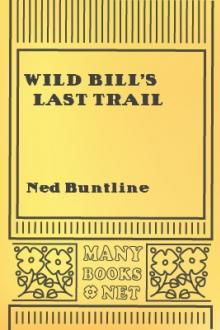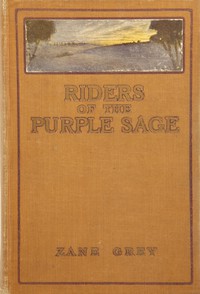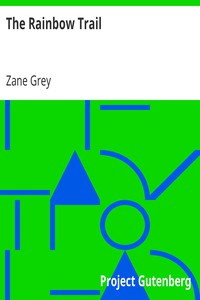The Heritage of the Desert: A Novel, Zane Grey [books for 9th graders .txt] 📗

- Author: Zane Grey
Book online «The Heritage of the Desert: A Novel, Zane Grey [books for 9th graders .txt] 📗». Author Zane Grey
From the cover of the bush he peered again over the cliff. The cabin with its closed door facing him was scarcely two hundred feet down from his hiding-place. One of the rustlers sang as he bent over the camp-fire and raked the coals around the pots; others lounged on a bench waiting for breakfast; some rolled out of their blankets; they stretched and yawned, and pulling on their boots made for the spring. The last man to rise was Snap Naab, and he had slept with his head on the threshold of the door. Evidently Snap had made Mescal a prisoner in the cabin, and no one could go in or out without stepping upon him. The rustler-foreman of Holderness's company had slept with his belt containing two Colts, nor had he removed his boots. Hare noted these details with grim humor. Now the tall Holderness, face shining, gold-red beard agleam, rounded the cabin whistling. Hare watched the rustlers sit down to breakfast, and here and there caught a loud-spoken word, and marked their leisurely care-free manner. Snap Naab took up a pan of food and a cup of coffee, carried them into the cabin, and came out, shutting the door.
After breakfast most of the rustlers set themselves to their various tasks. Hare watched them with the eyes of a lynx watching deer. Several men were arranging articles for packing, and their actions were slow to the point of laziness; others trooped down toward the corral. Holderness rolled a cigarette and stooped over the campfire to reach a burning stick. Snap Naab stalked to and fro before the door of the cabin. He alone of the rustler's band showed restlessness, and more than once he glanced up the trail that led over the divide toward his father's oasis. Holderness sent expectant glances in the other direction toward Seeping Springs. Once his clear voice rang out:
“I tell you, Naab, there's no hurry. We'll ride in tomorrow.”
A thousand thoughts flitted through Hare's mind—a steady stream of questions and answers. Why did Snap look anxiously along the oasis trail? It was not that he feared his father or his brothers alone, but there was always the menace of the Navajos. Why was Holderness in no hurry to leave Silver Cup? Why did he lag at the spring when, if he expected riders from his ranch, he could have gone on to meet them, obviously saving time and putting greater distance between him and the men he had wronged? Was it utter fearlessness or only a deep-played game? Holderness and his rustlers, all except the gloomy Naab, were blind to the peril that lay beyond the divide. How soon would August Naab strike out on the White Sage trail? Would he come alone? Whether he came alone or at the head of his hard-riding Navajos he would arrive too late. Holderness's life was not worth a pinch of the ashes he flecked so carelessly from his cigarette. Snap Naab's gloom, his long stride, his nervous hand always on or near the butt of his Colt, spoke the keenness of his desert instinct. For him the sun had arisen red over the red wall. Had he harmed Mescal? Why did he keep the cabin door shut and guard it so closely?
While Hare watched and thought the hours sped by. Holderness lounged about and Snap kept silent guard. The rustlers smoked, slept, and moved about; the day waned, and the shadow of the cliff crept over the cabin. To Hare the time had been as a moment; he was amazed to find the sun had gone down behind Coconina. If August Naab had left the oasis at dawn he must now be near the divide, unless he had been delayed by a wind-storm at the strip of sand. Hare longed to see the roan charger come up over the crest; he longed to see a file of Navajos, plumes waving, dark mustangs gleaming in the red light, sweep down the stony ridge toward the cedars. “If they come,” he whispered, “I'll kill Holderness and Snap and any man who tries to open that cabin door.”
So he waited in tense watchfulness, his gaze alternating between the wavy line of the divide and the camp glade. Out in the valley it was still daylight, but under the cliff twilight had fallen. All day Hare had strained his ears to hear the talk of the rustlers, and it now occurred to him that if he climbed down through the split in the cliff to the bench where Dave and George had always hidden to watch the spring he would be just above the camp. This descent involved risk, but since it would enable him to see the cabin door when darkness set in, he decided to venture. The moment was propitious, for the rustlers were bustling around, cooking dinner, unrolling blankets, and moving to and fro from spring and corral. Hare crawled back a few yards and along the cliff until he reached the split. It was a narrow steep crack which he well remembered. Going down was attended with two dangers—losing his hold, and the possible rattling of stones. Face foremost he slipped downward with the gliding, sinuous movement of a snake, and reaching the grassy bench he lay quiet. Jesting voices and loud laughter from below reassured him. He had not been heard. His new position afforded every chance to see and hear, and also gave means of rapid, noiseless retreat along the bench to the cedars. Lying flat he crawled stealthily to the bushy fringe of the bench.
A bright fire blazed under the cliff. Men were moving and laughing. The cabin door was open. Mescal stood leaning back from Snap Naab, struggling to release her hands.
“Let me untie them, I say,” growled Snap.
Mescal tore loose from him and stepped back. Her hands were bound before her, and twisting them outward, she warded him off. Her dishevelled hair almost hid her dark eyes. They burned in a level glance of hate and defiance. She was a little lioness, quivering with fiery life, fight in every line of her form.
“All right, don't eat then—starve!” said Snap.
“I'll starve before I eat what you give me.”
The rustlers laughed. Holderness blew out a puff of smoke and smiled. Snap glowered upon Mescal and then upon his amiable companions. One of them, a ruddy-faced fellow, walked toward Mescal.
“Cool down, Snap, cool down,” he said. “We're not goin' to stand for a girl starvin'. She ain't eat a bite yet. Here, Miss, let me untie your hands—there. . . . Say! Naab, d—n you, her wrists are black an' blue!”
“Look out! Your gun!” yelled Snap.
With a swift movement Mescal snatched the man's Colt from its holster and was raising it when he grasped her arm. She winced and dropped the weapon.
“You little Indian devil!” exclaimed the rustler, in a rapt admiration. “Sorry to hurt you, an' more'n sorry to spoil your aim. Thet wasn't kind to throw my own gun on me, jest after I'd played the gentleman, now, was it?”
“I didn't—intend—to shoot—you,” panted Mescal.
“Naab, if this's your Mormon kind of wife—excuse me! Though I ain't denyin' she's the sassiest an' sweetest little cat I ever seen!”
“We Mormons don't talk about our women or hear any talk,” returned Snap, a dancing fury in his pale eyes. “You're from Nebraska?”
“Yep, jest a plain Nebraska rustler, cattle-thief, an' all round no-good customer, though I ain't taken to houndin' women yet.”





Comments (0)